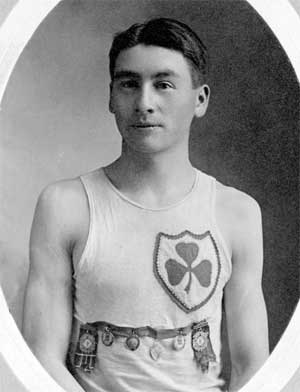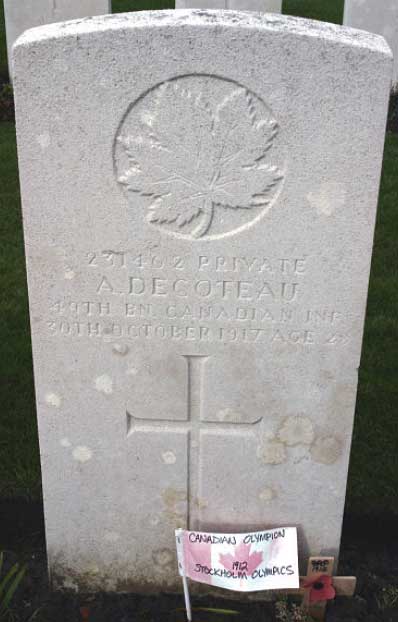This publication is available upon request in alternate formats.
Alexander (Alex) Wuttunee Decoteau was born on the Red Pheasant Reserve in Saskatchewan in 1887. His father was Métis, and his mother was Cree. He moved to Alberta as a young man and became our country’s first Indigenous police officer when he joined the Edmonton force in 1909!
Alex was a remarkable long-distance runner and he won most of the major races in Western Canada during his athletic career. He even qualfied to represent Canada and compete in the 5,000-metre race at the 1912 Olympics in Stockholm, Sweden! He made it to the finals but, unfortunately, suffered leg cramps which affected his performance.

Alexander Decoteau in 1912.
Photo: City of Edmonton Archives EA-10-2072
When the First World War was raging, Alex enlisted in the Canadian Army in 1916. He served with the 202nd Infantry Battalion (known as the Edmonton Sportsman's Battalion) and later with the 49th Battalion. His running skills were put to good use in his role as the battalion messenger, a very dangerous job of running messages across battlefields in the face of enemy fire. This did not stop him from running in races however. In fact, he continued to run and entered military races in England, where his group was training. At a military sports event in England (which were common distractions from war for the soldiers at the time) he won a five-kilometre race. King George V was watching the event and awarded him with his own personal gold pocket watch as a prize! He treasured this special watch and kept it in his pocket.
During the fall of 1917, Private Decoteau fought with the Canadian troops through endless rains and knee-deep mud to capture the small town of Passchendaele (pronounced Pa-chen-dale) in the country of Belgium. By November 10, 1917, the Canadians were successful in capturing the village from the Germans. However, the Battle of Passchendaele was one of the worst battles of the First World War and success came at a great cost. Approximately 16,000 Canadians were killed or wounded. A century later, the Battle of Passchendaele is remembered as one of the worst horrors of the First World War.
Tragically, one of those Canadians was Private Decoteau. He was killed on October 30, 1917 just before his 30th birthday. It is said that the German sniper who shot him kept the special watch that the King had awarded to Alex. However, his friends later recovered the treasured watch and sent it home to Decoteau’s mother.

Gravestone of Alex Decoteau
Private Decoteau was buried in the Passchendaele British New Cemetery in Ypres, Belgium, overlooking the pastoral farmers' fields that spill out over the Belgian countryside. A small rose bush sits just to the right of his grave.
Since a proper Cree burial did not occur, his family and friends performed a special ceremony in 1985 that would bring his spirit home to Edmonton, the city where he made such an impact. Members of the Red Pheasant First Nation, the Canadian Armed Forces and the Edmonton Police Force were all in attendance.
It has been 100 years since Decoteau died, but his name lives on. He continues to inspire and he is remembered. In 1967, he was inducted into the Edmonton Sports Hall of Fame where many of his sports accomplishments are recorded. The Edmonton Police Museum and Archives holds a number of his personal and military trophies and awards, including a participation medal from the Olympics.
As a police officer and an athlete, Decoteau established a special relationship with children. As a fitting tribute today, he is still a role model to children and adults alike, and his dedication to Canada and athletics are remembered through Alex Decoteau remembrance runs! The City of Edmonton started their Alex Decoteau run in 2001. It also has a street named after him – Decoteau Way, and a park – Decoteau Park. A five-kilometre Alex Decoteau Run as well takes in Belgium every year through the historic battlefield.